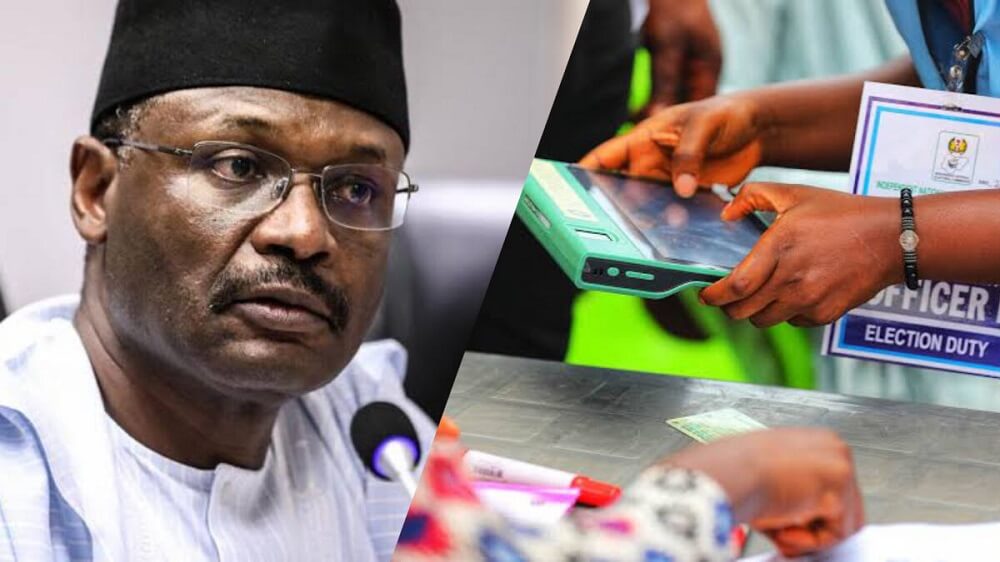
Mahmood Yakubu, INEC chairman (left)
The managing director of Galaxy Backbone, Muhammad Abubakar, says President Muhammadu Buhari’s regime blocked over 200 cyberattacks during the presidential and National Assembly elections on February 25, rising to 1.2 million the next day.
The result viewing portal of the Independent National Electoral Commission suffered a system collapse that forced it offline for several hours on election day, spawning a severe backlog in the transmission of presidential election results over the high throughput infrastructure.
Mr. Abubakar disclosed this at the opening session of a two-day ministerial training for GBB’s board members and management staffers on Tuesday in Abuja but did not say whether the cyberattacks had anything to do with the downtime INEC’s IReV suffered.
At the training tagged ‘Positioning the GBB Team for Effective Management and Leadership in the 4th Industrial Revolution’, Mr. Abubakar said the attacks rose to about 1.2 million a day after the election.
“On the election day alone, we were able to block more than 200 attacks, and the next day, the attacks geometrically increased to about 1.2 million, and all were blocked from our own businesses,” he said.
Mr. Abubakar said a business continuity and cyberspace protection committee had been formed to guard and regulate digital activities while optimizing Galaxy Backbone’s technical services.
Galaxy Backbone is the federal government’s information technology and shared services provider.
The Minister of Communication and Digital Economy, Isa Pantami, said the training was to evaluate and recalibrate Galaxy Backbone Limited regarding management and leadership for optimal outputs.
“Training is key when it comes to improving our performance, and at the same time, training is key when it comes to our self-evaluation, self-judgement, self-assessment,” the minister stated.
Mr. Pantami added, “We need to think out of the box to discover new areas for government revenue generation. We need to be proactive in our thinking; let us not maintain the same process every day when it comes to revenue generation.”
On February 23, the ministry inaugurated the cyberspace and information and communication technology infrastructure protection committee ahead of the 2023 general elections.
IReV, which the electoral office designed to receive election result sheets directly from polling units, suffered an outage shortly after polls closed on Saturday afternoon. Polling agents could not upload results from the presidential election, while only a few attempts to upload federal parliamentary election results were successful.
Last Friday, chief mobiliser for the APC in the presidential election, Ekene Enefe, accused the Labour Party and Peoples Democratic Party of spamming the server of the INEC with several hack attacks.
“Each party has a situation room. They (sic) …the result and they knew they were losing and they want to cling on something and what they want to cling on was the transmission of the result from the portal,” claimed Mr Enefe on ARISE TV.
The APC strategist said people “don’t know how many times INEC server was hacked and attacked and these were done by political parties that brought in Russian and Israeli hackers (sic) …to hack into INEC server and to transmit their own results and create chaos. None of them succeeded.”
(NAN)
The managing director of Galaxy Backbone, Muhammad Abubakar, says President Muhammadu Buhari’s regime blocked over 200 cyberattacks during the presidential and National Assembly elections on February 25, rising to 1.2 million the next day.
The result viewing portal of the Independent National Electoral Commission suffered a system collapse that forced it offline for several hours on election day, spawning a severe backlog in the transmission of presidential election results over the high throughput infrastructure.
Mr. Abubakar disclosed this at the opening session of a two-day ministerial training for GBB’s board members and management staffers on Tuesday in Abuja but did not say whether the cyberattacks had anything to do with the downtime INEC’s IReV suffered.
At the training tagged ‘Positioning the GBB Team for Effective Management and Leadership in the 4th Industrial Revolution’, Mr. Abubakar said the attacks rose to about 1.2 million a day after the election.
“On the election day alone, we were able to block more than 200 attacks, and the next day, the attacks geometrically increased to about 1.2 million, and all were blocked from our own businesses,” he said.
Mr. Abubakar said a business continuity and cyberspace protection committee had been formed to guard and regulate digital activities while optimizing Galaxy Backbone’s technical services.
Galaxy Backbone is the federal government’s information technology and shared services provider.
The Minister of Communication and Digital Economy, Isa Pantami, said the training was to evaluate and recalibrate Galaxy Backbone Limited regarding management and leadership for optimal outputs.
“Training is key when it comes to improving our performance, and at the same time, training is key when it comes to our self-evaluation, self-judgement, self-assessment,” the minister stated.
Mr. Pantami added, “We need to think out of the box to discover new areas for government revenue generation. We need to be proactive in our thinking; let us not maintain the same process every day when it comes to revenue generation.”
On February 23, the ministry inaugurated the cyberspace and information and communication technology infrastructure protection committee ahead of the 2023 general elections.
IReV, which the electoral office designed to receive election result sheets directly from polling units, suffered an outage shortly after polls closed on Saturday afternoon. Polling agents could not upload results from the presidential election, while only a few attempts to upload federal parliamentary election results were successful.
Last Friday, chief mobiliser for the APC in the presidential election, Ekene Enefe, accused the Labour Party and Peoples Democratic Party of spamming the server of the INEC with several hack attacks.
“Each party has a situation room. They (sic) …the result and they knew they were losing and they want to cling on something and what they want to cling on was the transmission of the result from the portal,” claimed Mr Enefe on ARISE TV.
The APC strategist said people “don’t know how many times INEC server was hacked and attacked and these were done by political parties that brought in Russian and Israeli hackers (sic) …to hack into INEC server and to transmit their own results and create chaos. None of them succeeded.”
(NAN)





